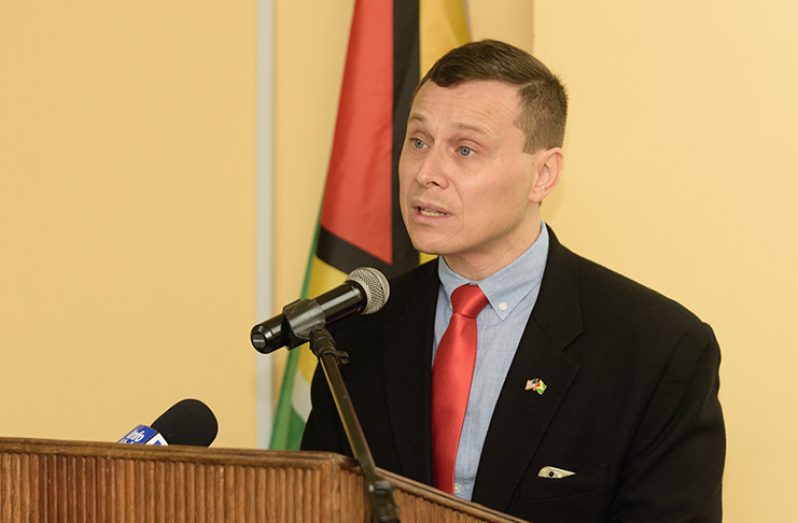…USAID, Gov’t roll out intensive training for health workers
MEDICAL personnel operating under the Public Health Ministry are being equipped with the requisite skills and knowledge needed to provide psychosocial support to parents and caregivers of Zika-affected children.
On Tuesday, a training of trainers’ workshop opened at Cara Lodge under the USAID Zika Maternal and Child Survival Project, where medical personnel from a wide cross-section of areas were in attendance.
The U.S. Embassy Deputy Chief of Mission, Terry Steers-Gonzalez, said the two-day forum will equip the medical personnel with coping skills and strategies to effectively manage daily challenges and improve health outcomes.
“As we know, caring for children with disabilities presents unique challenges. Highlighting the impact that parental stress and depression can have on children’s development, the training will prepare mental health, physiotherapy and rehabilitation professionals to roll-out national training on clinical and non-clinical aspects of care of affected infants and children,” the U.S Embassy deputy chief of mission explained.
Staff will also be trained on how to teach caregivers to conduct recovery therapies at home and early infant and child stimulation. Guyana recorded its first Zika case back in January 2016, at a time when other countries in the region were being faced with the disease for the very first time as well. By February 1, 2016, the World Health Organisation (WHO) had declared Zika a public health emergency of international concern. It was not long after that the U.S. Government launched its Zika project, aimed at reducing the number of pregnancies negatively affected by the Zika virus infection.
“Zika continues to pose a serious threat to public health across the Caribbean and in Guyana,” the U.S Embassy deputy chief of mission said, adding “we all saw the recent story about the World Health Organisation (WHO) having ‘downgraded’ the Zika threat for the entire Caribbean, but hopefully all in this room understand how wrong that story was. The truth is that Zika continues to be transmitted in the Caribbean, but at lower levels than during the outbreak two years ago.”
He said the U.S Centre for Disease Control is still registering cases of Zika infection among American tourists returning from the Caribbean, and as a result it maintains its warning that pregnant women should not travel to areas with risk of Zika. The Caribbean, including Guyana, has been listed as an area of risk.
As such, it is important for the issues linked to the disease to remain on the priority list of matters to be continuously addressed, he said.
“The multi-faceted Zika project, which is implemented throughout the region, supports vector control, maternal and child health, and behaviour change communities. The Zika project is also partnering with dedicated public health specialists to improve the capacity of providers, to counsel pregnant women and their partners on the risks of Zika infection to newborns,” he explained.
The U.S Embassy deputy chief of mission said at this stage, raising awareness is critical to effect the necessary lifestyle changes, and reduce the likelihood of the disease spreading.
It was pointed out that just last week, sensitisation activities were carried out in 165 schools, 150 health centres and across 60 local communities, in collaboration with the Guyana Red Cross Society.
“This initiative, which covered select communities in seven regions, included community clean-ups to destroy mosquito breeding grounds. In addition, the project supported the establishment of quality improvement teams at 10 health facilities, and the training of 20 healthcare workers, and 25 occupational therapists in the care of small babies and Zika-affected infants,” he explained.
The U.S Embassy Deputy Chief of Mission noted that most of the activities here focus on prevention and treatment, however, he said, the U.S. and its partner – the Public Health Ministry is cognisant that this is more than just physical health, but that it has significant psychological and social implications, hence the hosting of the training forum.
Director of Physiotherapy and Rehabilitation Services at the Public Health Ministry, Arianne Mangar, was among the officials present.




.png)









